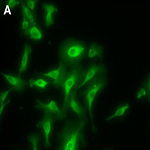Lymphoid enhancer-binding factor1, a representative of vertebrate-specific Lef1/Tcf1 sub-family,is a Wnt-beta-catenin pathway target gene in human endothelial cells which regulates matrix metalloproteinase-2 expression and promotes endothelial invasion
Main Article Content
Abstract
Background
Wnt signaling is activated in many types of cancer and normal physiological processes. Various Wnt-related secreted factors may influence angiogenesis both in the tumor microenvironment and in normal tissues by direct action on endothelial cells. The mechanism of this Wnt action in angiogenesis is not well defined. We hypothesize that endothelial cells are responsive to Wnt signals and that Lef1, a member of the vertebrate-specific Wnt/beta-catenin throughput-inducing transcription factors' sub-family Lef1/Tcf1, mediates this responsiveness and promotes endothelial cell invasion.Methods
A human endothelial cell line, EAhy926 was exposed to Wnt3a or directly transfected with Lef1. Readouts included assessment of nuclear beta-catenin, Wnt throughput with a SuperTOPflash reporter assay, induction of Lef1 transcription, induction of matrix metalloproteinase (MMP)-2 transcription, cell proliferation and cell invasion through a matrix in vitro. The effects on MMP2 were also evaluated in the presence of Lef1 silencing siRNA.
Results
Wnt3a increased nuclear beta-catenin and up-regulated Wnt/beta-catenin throughput. Wnt3a increased Lef1 transcription and activity of the Lef1 promoter. Both Wnt3a treatment and Lef1 overexpression induced MMP2 transcription but this effect was completely abrogated in the presence of Lef1 siRNA. Inhibition of Lef1 also reduced basal MMP2 levels suggesting that Lef1 regulates MMP2 expression even in the absence of exogenous Wnt pathway activation. Lef1 slightly increased proliferation of EAhy926 cells and increased invasion by more than two-fold.Conclusions
EAhy926 cells activate canonical Wnt signaling in response to Wnt3a ligand. The Wnt target Lef1 specifically regulates MMP2 expression in these cells and promotes endothelial cell invasion. The EAhy926 cell line provides a convenient alternative to primary human umbilical vein endothelial cells (HUVEC) in the study of angiogenesis and the role of Wnt signaling on endothelial cell function.Article Details
How to Cite
PLANUTIENE, Marina; PLANUTIS, Kestutis; HOLCOMBE, Randall F.
Lymphoid enhancer-binding factor1, a representative of vertebrate-specific Lef1/Tcf1 sub-family,is a Wnt-beta-catenin pathway target gene in human endothelial cells which regulates matrix metalloproteinase-2 expression and promotes endothelial invasion.
Vascular Cell, [S.l.], v. 3, n. 1, p. 28, dec. 2011.
ISSN 2045-824X.
Available at: <https://vascularcell.com/index.php/vc/article/view/10.1186-2045-824X-3-28>. Date accessed: 19 feb. 2026.
doi: http://dx.doi.org/10.1186/2045-824X-3-28.
Section
Original Research

